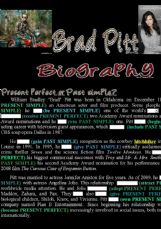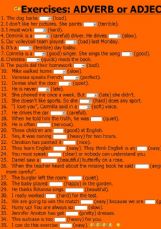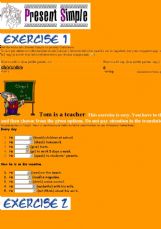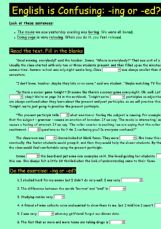
The article: "a/an" or "the"
With this worksheet students learn the difference between the definite and the indefinite article. There�s a short grammar explanation, many examples and some activities to practise. I hope you find it useful!
Level: elementary
Age: 8-17
Type: worksheet

His or Her TOYS
Vocabulary: matching toys
Writing: �It�s his kite. It�s her doll.�
Colouring: Listen & colour (pair work - partner dictates colours, then compare their worksheets)
Level: elementary
Age: 7-12
Type: worksheet

"My Pet / Dream Pet" - (5th in the series) - 2nd 45-minute-lesson for Upper Elementary or Lower Intermediate Students
This is no. 5 of the reading/writing series. This time students complete a paragraph describing a pet (tarantula) according to the information given in the fact file. Then they complete another paragraph in a less guided way ( a parrot) and, finally, they complete the fact file and write a paragraph about their own pet or their dream pet. Then some...
Level: elementary
Age: 10-12
Type: worksheet

Countable or Uncountable (1 of 2)
First worksheet about countable and uncountable nouns. Students write "C" or "U" in the circles, then they find the words in the corresponding worksearch and write them under the pictures. Answer key included. Enjoy it!!
Level: elementary
Age: 10-17
Type: worksheet

Future Continuous or Future Perfect?
I�ve created this worksheet to be done after the one I uploaded 2 days ago:http://www.eslpr intables.com/printab le.asp?id=480769#the top , but it can be used individually. KEY INCLUDED. Students first choose the right verb form from the bubble to make complete sentences/questions. Then they read a dialogue and cross out the wrong verb forms. They ...
Level: intermediate
Age: 13-17
Type: worksheet

House and Furniture: Practising there is/are; a/an, some, any; place prepositions
Here are 5 exercises in which students review the vocabulary connected to the house, there is/are, a/an, some and any. They also review some place prepositions. Hope you like it!
Level: elementary
Age: 8-17
Type: worksheet

Gerund or Infinitive?
My students always find it difficult to memorize the rules, so I made this worksheet in order to make them practise.
Level: intermediate
Age: 12-17
Type: worksheet

LINKING WORDS -AND-OR-BUT-SO-BECAU SE-BECAUSE OF (B&W VERSION INCLUDED)
Worksheet to teach or learn some of the most common linking words. It can be used as a classroom poster.I hope you like it and find it useful. Have a nice evening/day. Hugs!
Level: elementary
Age: 11-14
Type: worksheet

British Breakfast - for Elementary or Lower Intermediate students
This is a worksheet I�ve done today about British breakfast after an article in a Mary Glasgow Magazine.. Students label the breakfast and then give their opinion on British fry-up - delicious or disgusting. They just have to tick to make it easier for them. But then they must share their ideas with their partner�s and, finally, with the whole clas...
Level: intermediate
Age: 10-17
Type: worksheet

To Eat Or Not To Eat... Fast Food
Students form groups to discuss the theme "How much fast food is more than enough?". Each group takes turns to: speak for/ against the fast food industry; warn teenagers about the dangers of obesity; or present solutions to the fast food issue. This type of activity usually generates a lot of discussion around the theme. B&W version included.
Level: intermediate
Age: 14-17
Type: worksheet

What�s your house like? - Reading Comprehension + Writing for Intermediate or Upper Elementary students
This is a worksheet I�ve just finished doing. (3 pages)Reading tasks: scanning the text for information (exercise A - multiple choice), reading the first part of the text and sentence completing; reading the rest of the text and solving a T/F with quotations, and, finally, finding some references. Students then write a similar text describing their...
Level: intermediate
Age: 12-17
Type: reading

For or against FACEBOOK (Debating)
Well, here�s another worksheet aimed at debating. This one deals with FACEBOOK and its IMPACT on children. It is composed of a list of pros and cons meant for upper-intermediate. Follows a second sheet proposing useful expressions for debating and taking position orally. Hope you�ll find it useful !! Hugs !!
Level: intermediate
Age: 12-17
Type: worksheet

Should or Shouldn�t
This worksheet is about using should and shouldn�t correctly. Answer key is included. I hope you like it.
Level: intermediate
Age: 9-17
Type: worksheet

Some/ Any/ No/ Every and Compounds
4 different exercises with an increasing level of complexity, but all very simple. KEY INCLUDED. 1- matching; 2- filling in the gaps; 3- completing a dialogue; 4- rephrasing (There is nothing to do - There isn�t anything to do...). Wish you all a wonderful week. Hugs, mena:))))
Level: elementary
Age: 10-17
Type: worksheet

ADJECTIVE OR ADVERB? GRAMMAR AND EXERCISES (B&W VERSION INCLUDED)
Grammar guide and exercises to learn the use of adverbs in contrast with adjectives. I hope you like it and find it useful. Have a nice evening/day. Hugs!
Level: elementary
Age: 11-14
Type: worksheet
|

MUCH MANY A LOT OF
Practising much, many and a lot of.
Level: intermediate
Age: 12-17
Format: PowerPoint

some vs any
A nice ppt where ss will help the bee to complete the sentences choosing the correct honeycomb according to some or any. Enjoy it!
Level: elementary
Age: 8-17
Format: PowerPoint

THERE IS OR THERE ARE
AN EASY WAY TO PRACTICE THERE IS / THERE ARE IN THE AFFIRMATIVE, NEGATIVE AND INTERROGATIVE FORM
Level: elementary
Age: 6-17
Format: PowerPoint

ARTICLES - a, an, the or "nothing"
Students have to complete the sentences with the correct article if necessary.
Level: intermediate
Age: 13-17
Format: PowerPoint

Pass the word - American vs British English *GAME* (1/6)
A quiz based on my worksheet http://www.eslprinta bles.com/printable.a sp?id=704344#thetop to practise the difference between American and British English. The file is huge, so I had to divide it into several parts. Sorry for the inconvenience. Have fun, mada :)
Level: elementary
Age: 12-14
Format: PowerPoint

WHAT VEGETABLES ARE THERE IN THE FRIDGE? (PART 2)
VOCABULARY ABOUT VEGETABLES AND USE OF SOME,A,AN.
Level: intermediate
Age: 10-14
Format: PowerPoint

How much and how many
The story of two shops ,can you guess why we call them the(How much shop ) and the ( how many shop )?
Level: elementary
Age: 6-10
Format: PowerPoint

PRESENT SIMPLE OR CONTINUOUS - GAME
Thank you :-)
Level: elementary
Age: 10-12
Format: PowerPoint

how much-many/some-any/a -an/ESCAPE GAME/part 2
Granny is locked in a house! give the right answer and after that you unlock and activate an object in the room. Move your cursor on the objects and find which one is activated. After you click on the activated object, something strange happens and finally the granny gets out of the house.
Level: elementary
Age: 11-17
Format: PowerPoint

A, an, the, some or nothing
Click on the correct words to complete the sentences. If you choose the right words, they will fly in the sentence, if wrong - disappear. All the content again belongs to Monique Karagozian and can be found in her ws: www.eslprintables.co m/printable.asp?id=8 58879#thetop Thank you, dear Monique, for letting me use your work as basis of mine, your ...
Level: elementary
Age: 8-100
Format: PowerPoint

Who wants to be a millionaire? Verbs followed by infinitives or gerunds
Ideal for gerund and infinitive practice. It�s a ppt divided in 3 parts as there is the size limit. Part one is just the first slide por the presentation of the game. Part two contains all the slides with the questions. Part three contains the slides behind the answers and the links: phone and gradual help with the answers. You need part three to m...
Level: elementary
Age: 11-17
Format: PowerPoint

-ED or -ING ADJECTIVES - GAME (1)
Hope you like it.
Level: intermediate
Age: 12-14
Format: PowerPoint

Emergency Phone Game
My first try making this type of games which i liked a lot..thanks to xani, evelinamaria, veronika74 whose outstanding work has been great inspiration to me...i�d appreciate ur feedback on any improvements i should make
Level: elementary
Age: 6-17
Format: PowerPoint

British English vs. American English
Can two people from two different countries with the same language understand each other? Sometimes it�s not easy, yet it is not impossible. This will help your students acknowledge the differences.
Level: intermediate
Age: 12-17
Format: PowerPoint

Have or Has?
game ( with sound)
Level: elementary
Age: 10-12
Format: PowerPoint
|

A, An or The
An exercise to practise choosing the correct article.
Level: elementary
Age: 8-100

Brad Pitt BIOGRAPHY Past simple or Present perfect?
Read, put the verbs in the right form and choose the correct answer, complete IRREGULAR VERBS LIST and answer the questions! Enjoy!
Level: elementary
Age: 9-100

present simple or continuous
3 exercises to practise the present simple and continuous together. I hope you find them useful.
Level: elementary
Age: 8-12

WILL or GOING TO?
It�s an activity for students to practise the future tenses: WILL and GOING TO in a context. I hope you find it useful!
Level: elementary
Age: 10-100

Adjective or adverb
Revise adjectives and adverbs with some exceptions!
Level: elementary
Age: 12-100

Present Perfect Simple or past Simple
This material consists of 2 exercises more than 50 examples.
Level: intermediate
Age: 10-100

20 sentences Present Simple or Continuous
This material consists of 2 exercises and a table. It provides 20 sentences to practice the difference between Present Simple and Continuous.
Level: elementary
Age: 5-100

Present Simple or Present Continuous?
Basic online exercise which students can use to practise the use of the Present Simple and Present Continuous.
Level: elementary
Age: 7-100

Simple Past or Past Continuous?
Short exercise on Simple Past or Past Continuous verb tense with examples.
Level: intermediate
Age: 10-100

Perfect Tense or Past Tense
An explaining exercise about when to use the Perfect Tense (Present Perfect) or the Past Perfect.
Level: intermediate
Age: 10-100

English is Confusing (Adjectives ending in -ed or -ing)
Grammar: adjectives ending in -ED vs -ING. This online exercise consists of a reading text explaining the grammar point in a humourous way (including 10 cloze questions) and 15 practice sentences.
Level: intermediate
Age: 10-100

Pronouns �no� and �none�, either ...or/neither ...nor, either/neither.
Nice exercises for classroom activities. Enjoy, please.
Level: intermediate
Age: 9-100

Some or Any
Some or any - 2 activities: 1) fill the blanks with some and any; 2) multiple choice with 3 options (something/body, anything/body, somewhere/anywhere). Enjoy :) (It�s my first online activity) :)
Level: intermediate
Age: 10-100

4 EXERCISES (45 sentences) Present Perfect Simple or Present Simple (contradictions)
4 exercises to practice Do not have & have not + 3rd form of the verb.
Level: intermediate
Age: 7-100

Past Simple or Present Perfect Simple
Ss have to decide whether the adverb is used with Past simple or Present Perfect Simple
Level: elementary
Age: 8-100
|